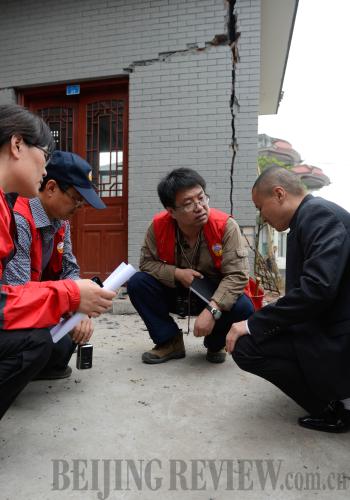|
 |
|
ON-SITE INVESTIGATION: Researchers with the China Earthquake Administration assess damaged homes in Shangli Town in Ya'an City, Sichuan Province, on April 28 (LI QIAOQIAO) |
Local and provincial authorities have initiated post-quake reconstruction in Ya'an City of southwest China's Sichuan Province in the wake of a deadly 7.0-magnitude earthquake on April 20 that left 196 dead and more than 13,400 injured.
The quake affected more than 2 million people, and about 295,000 people had been relocated, said Zhong Mian, Vice Governor of Sichuan, at a press conference held in Beijing on April 25.
Damage assessment has begun to prepare for reconstruction in affected areas. A joint work group of experts from the Ministry of Civil Affairs (MCA), the China National Commission for Disaster Reduction and the Ministry of Education was dispatched to Ya'an on April 25, according to a statement released by the MCA on April 26.
The group is tasked with determining the scale of the damage by conducting on-site inspections and holding symposiums. It will primarily focus on the damage to houses and infrastructure, as well as losses in the industrial and public service sectors.
The assessment will provide a scientific basis for post-quake relief and reconstruction work, the MCA said.
Living safely
According to the April 25 press conference, more than 250,000 houses were destroyed in the quake in Ya'an.
With the government's relief efforts already shifting toward reconstruction, the safety of housing structures must be prioritized, with special attention being given to close supervision over project design and construction quality, said Fan Xiao, a noted geologist in Chengdu, the provincial capital.
"Whether the rebuilt houses withstand future tremors will be a major test for the government," Fan said. "It's crucial to fully evaluate all buildings in the quake-hit—and quake-prone—areas and strictly implement national quake-proof standards in building homes, schools and other public facilities."
Besides, the debris in Ya'an also highlighted another worrisome truth: houses in rural areas are especially vulnerable to quake damage.
According to the State Council Information Office, more than 70 percent of the 250,000 collapsed houses were located in rural areas.
It was also reported that in some villages and townships in Ya'an, more than 90 percent of houses were damaged or destroyed in the quake.
Qiu Jian, chief planner with the Sichuan Department of Housing and Urban-Rural Development, explained that the department had dispatched 400 experts to make assessments on the conditions of the affected houses in the quake region.
"The collapsed buildings were mainly built by the villagers themselves. As for the buildings constructed as part of post-quake programs following the Wenchuan earthquake, none of them collapsed though these buildings bore some cracks or broken walls," Qiu said.
Traditionally, as private properties, houses in villages are built by those who plan to live in them. This usually means that the structures are not equipped with quake-resistant technology and that construction is done without proper supervision, partly due to a lack of safety awareness and partly due to a lack of money.
Low-income rural residents in particular need both professional guidance and economic input from the government to help them build safe houses, said Zhao Fengxin, a researcher with the China Earthquake Disaster Prevention Center under China Earthquake Administration.
Soothing souls
As a part of post-quake reconstruction work, psychological intervention is important to help people deal with the quake's emotional impact and move on, said Zhu Zhuohong, a counselor with the Institute of Psychology of Chinese Academy of Sciences.
In the wake of the earthquake, Sichuan's Health Department set up a workgroup on psychological and medical support along with two expert panels.
About 80 experts from Sichuan's eight medical institutions have entered hard-hit Lushan and Baoxing counties in Ya'an to evaluate local residents' psychological needs, said Zhang Wei, deputy head of the workgroup.
These experts are training local medical staff on psychological intervention and rehabilitation, Zhang said, adding that additional support from other provinces will be brought in if needed.
The Wenchuan earthquake in 2008 raised the importance of psychological support among the government and the public, said Liu, adding that the country has made progress on the policy front but should also aim for better implementation among various government departments.
He calls for a fund specially earmarked for psychological programs from the budget for relief efforts.
Email us at: yinpumin@bjreview.com | 